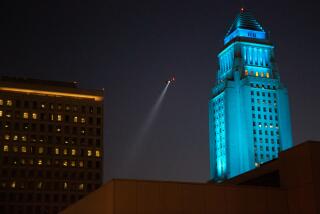Hughes Gets $15.5 Million in Frozen B-2 Radar Funds : Defense: The auditor’s decision frees money withheld since 1986. But a whistle-blower suit on the alleged improper billing is headed for trial.
- Share via
A Defense Department agency has released $15.5 million that had been withheld from Hughes Aircraft since 1986, when government auditors alleged that the firm improperly billed the Air Force for development of the B-2 bomber’s radar system.
The Defense Contract Audit Agency asserted in a memo only last March that Hughes had overcharged the government by pooling costs--under a secret, so-called commonality agreement--for developing three different radar systems and not disclosing the arrangement to the government.
In 1986, the audit agency issued a finding of “suspected irregularity” and referred the matter to the Department of Justice, alleging that Hughes had overcharged the government $29 million through the arrangement. No criminal action was ever taken.
Hughes allegedly charged the B-2 radar program for improvements to the F-15 fighter’s radar and work on two other fighter radar programs at its Radar Systems Group in El Segundo.
Hughes has fervently denied wrongdoing in the case, arguing that the government misunderstood the facts and that all the costs were properly allocated among the programs. Hughes attorneys said it was the Air Force that encouraged the firm to save money by using common technology and hardware on different programs.
In November, the audit agency apparently had a change of mind, released the $15.5 million and now agrees with Hughes, according to documents obtained by The Times.
The chief Pentagon auditor at Hughes, Jeffrey L. McGowan, wrote in a memorandum that the original determination was correct, based on the facts available. But because of the secrecy surrounding the B-2 program, the agency did not have all the facts.
McGowan said that because the classification on the program “precluded Hughes from discussing any aspect of the B-2 program with any other Hughes customers or Air Force program office personnel not cleared on the B-2, this prevented Hughes from disclosing full details” of its internal commonality agreement.
The memorandum apparently closes the administrative case in the dispute, but a whistle-blower lawsuit on the same issue remains headed for trial this year.
The suit was brought by William Schumer, the Hughes contracting executive responsible for the B-2 program. Schumer’s attorney, Philip Benson, disputed the audit agency’s contention and said it would have no bearing on the suit. Benson termed “ridiculous” the agency’s explanation that secrecy prevented it from getting all the facts.
“It is completely inconsistent with what we know, based on our discovery and the documents in the case,” Benson said.
Benson asserted that Hughes did not save the government any money by pooling its development efforts for common hardware on the different radar systems, because company documents show that Hughes billed the government for developing the common hardware more than once.
More to Read
Inside the business of entertainment
The Wide Shot brings you news, analysis and insights on everything from streaming wars to production — and what it all means for the future.
You may occasionally receive promotional content from the Los Angeles Times.











